Doctor of Philosophy in Experimental Psychology (M.S.-Ph.D.)
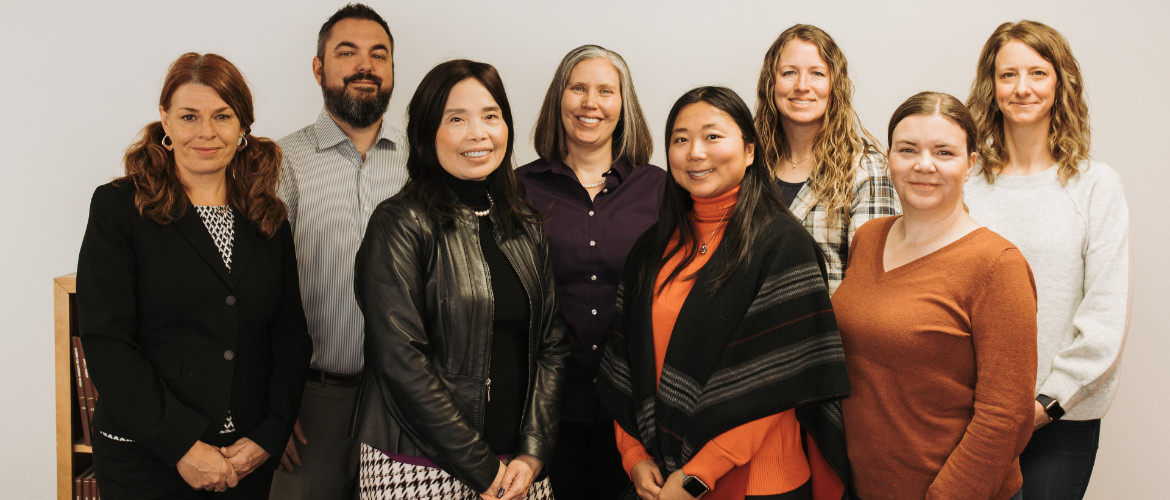
Applications open for Fall 2025
Deadline is December 1, 2024
GRE tests are not required.
The Experimental Psychology Ph.D. Program at Idaho State University welcomes applications for Fall 2025!
Please see below for additional information about our program.
Contents
Interest in the Experimental Psychology Program
Applicant Qualifications, Information, and Timeline
Applicant Student Statistics for the Ph.D. Program
ISU Psychology Dept Policies and Program Handbooks 2023-2024
Graduate Psychology Courses: Goals and Objectives
Interest in the Experimental Psychology Program
If you are interested in our program, please complete this form to request information from ISU's Graduate School.
If you have specific questions about our program, you can contact Xiaomeng (Mona) Xu, the Director of Experimental Training.
Experimental Faculty
Lawrence P. Behmer Jr., Ph.D.
Assistant Professor, Experimental Psychology
Specialty Areas: Cognitive Control, Human Motor Performance, and Cognitive Neuroscience
Michele Brumley, Ph.D.
Professor, Experimental Psychology - ISU Associate Vice President for Research and Economic Development
Specialty Areas: Behavioral Neuroscience and Developmental Psychobiology
Specialty Areas: Metacognition, Memory, Text Comprehension, and Cognitive Aging
Professor, Experimental Psychology
Specialty Areas: Behavioral Pharmacology and Behavioral Economics
Kandi Turley-Ames, Ph.D.
Professor, Experimental Psychology - Dean, College of Arts and Letters
Specialty Areas: Working Memory and Cognitive Strategies
Maria Wong, Ph.D.
Professor, Experimental Psychology
Specialty Areas: Developmental Psychology, Substance Use, Resilience, and Sleep problems
Professor, Experimental Psychology - Director of Experimental Training
Specialty Areas: Close Relationships, Behavioral Health, and Teaching/Mentoring
Faculty from the clinical program may also serve as mentors to students in the experimental program. To view their research interests, please see the Faculty page.
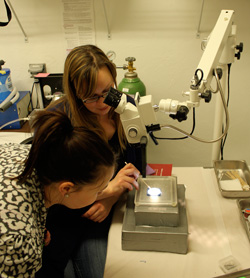
Scope and Program Goals
Doctoral training in Experimental Psychology provides students with an education and research training in core areas of psychological science (e.g., behavioral neuroscience, behavioral pharmacology, cognition, developmental psychology, learning, personality, social psychology, research methodology, and statistics). Although each of these areas is not considered a separate degree program, our mentor model does allow for individualized courses of study. Students are encouraged to select a mentor/advisor working in the student's area of interest during their first semester of study. The advisor serves to guide the student's course selections, thesis, and dissertation. Students may also work with other faculty at the same time.
Students who complete the Ph.D. program may pursue academic or non-academic careers. To prepare for their future careers, students need to (i) have a solid foundation in basic areas of psychology (breadth of knowledge) and also (ii) develop an expertise in their research areas (depth of knowledge). Our program offers a wide variety of courses to help students accomplish their career goals.
The Experimental Training Committee (ETC), in conjunction with the Psychology Department, has evolved a finite set of goals and objectives for all graduate students in the Experimental Psychology program. This list is considered dynamic and aspirational. Specific program activities designed to help students meet program goals and objectives are continuously subject to scrutiny and modification. Moreover, program objectives may expand or contract as outcome data inform the ETC of areas of success or relative ineffectiveness. The five program goals (numbered), objective list (lettered), and associated competencies are presented in outline form below.
Goal 1 – Area-Specific Research Knowledge and Expertise: Students will demonstrate knowledge and skills relevant for conducting independent research in a specialized area.
Objective 1A - Develop knowledge and expertise in a specialty area: Understand relevant theories and research in a specialized area; develop expertise in the area through completing research projects (e.g., thesis, dissertations and other projects) and disseminating research findings (i.e., publications).
Objective 1B - Active Research Participation: Consideration, integration, and synthesis of relevant literatures; formulation of defensible hypotheses; delineation of a method of study; implementation of an empirical study; analysis of data; formulation of defensible inferences or conclusions based on a study's findings; and clear communication of findings in written and oral formats.
Goal 2 - Breadth of Knowledge and Integration of Core Areas in Psychology: Students will demonstrate breadth of knowledge and ability to integrate across several core areas in psychology.
Objective 2A - Core Psychology Knowledge: Understand basic principles and critically evaluate major theories of psychology; demonstrate awareness of contemporary scholarly work in several core areas of psychology (e.g., behavioral neuroscience, behavioral pharmacology, cognitive, developmental, health, social, and personality); understand the historical foundations of contemporary psychology; and relate and apply core psychological knowledge to the investigation of research hypotheses.
Objective 2B - Integration of Research and Theories in Core Areas in Psychology: Understand the relationships among several core areas in psychology; integrate across theories and research in different core areas; identify how these areas complement each other in answering research questions.
Goal 3 – General Competencies in Research Methodology and Analysis: Students will demonstrate competence in understanding research methods, design, and statistical analyses.
Objective 3 - Competence in Research Methodology: Understanding of basic research designs and conditions associated with their appropriate use; knowledge of basic and advanced quantitative methods for sampling, describing, and analyzing behavior; critical evaluation of research, yielding informed and critical consumers and producers of published research.
Goal 4 - Effective communication skills: Students will communicate effectively, in both oral and written form, about their research and issues related to their profession.
Objective 4A - Presentation of Psychological Research: Formulate specific educational objectives for academic or professional presentations; review psychological research and organize central points; use appropriate media; communicate clearly in a manner appropriate for given audiences and lead question-and-answer discussions.
Objective 4B - Presentation of Psychological Knowledge and Teaching: Present existing research and theories clearly and systematically to different audiences, including students and lay people; gain experience in teaching and mentoring junior students.
Goal 5 - Professionalism: Students will conduct themselves in a professional manner.
Objective 5A - Professionalism: Demonstrate professionalism in classes, communication with colleagues and faculty, and research practices.
Objective 5B - Professional Identification: Active involvement with local, regional, and national psychology groups and organizations.
Goal 6 - Ethical Research Conduct: Students will receive training, demonstrate knowledge, and act in accordance with ethical research principles and appropriate codes of conduct.
Objective 6A - Ethical Knowledge: Knowledge of the APA code of conduct, including awareness and sensitivity to research conditions in which ethical principles may be a concern. Seek appropriate information and consultation when faced with ethical issues.
Objective 6B – Ethical Conduct: Acquisition of attitudes and skills that facilitate raising ethical concerns when they become apparent. Demonstrate a personal and professional commitment to ethical research conduct.
Goal 7 - Respect for Diversity: Diversity takes many forms, including of scientific perspectives, and sociodemographic variables, and therefore psychologists must both embrace the commonalities and differences between perspectives and groups.
Objective 7A – Knowledge Regarding Diversity: Familiarity with the Psychology Department commitment to ethical practices and collegiality, and acquisition of an awareness of the diversity that exists on campus and in the field of psychology.
Objective 7B – Respect Regarding Diversity: Acquisition of a broad knowledge for commonalities and differences in scientific perspectives and socio-demographic groups in their own work and academic experiences. Demonstration of respect for diverse scientific perspectives and socio-demographic group differences.
Applicant Qualifications, Information, and Timeline
Applicants are required to have a BA/BS in psychology or the equivalent (usually several classes in the core areas of psychology, statistics, and research methods), and an undergraduate GPA of 3.0 or higher for the last two years is preferred.
Students entering the Experimental doctoral program at Idaho State University with a master's degree will receive full or partial credit, based on consideration of completed course work and research. The Department Chair, the Director of Experimental Training, and the departmental subject matter expert(s) will review relevant documents and determine the course work and research, if any, that will be counted toward the doctoral degree.
The following items are required for a complete application: CV/resume, unofficial college(s) transcript, contact information for three people who have agreed to write letters of recommendation for you, and a personal essay. The essay should describe your preparation for graduate training, the research interests you might like to pursue during your graduate training, and the aspects of the program that match your training goals and interests, including your interest in the research of specific faculty members. Ideally, this essay will be 2-3 pages in length. You can learn about obtaining feedback on your essay at https://www.asfp.io/.
GRE scores are not required nor expected, and applications are considered complete without GRE scores. However, if students submit scores, the Experimental Training Committee may take them into consideration along with the rest of the application as part of a holistic review. Students who do not submit GRE scores will not be penalized in any way during the application review.
You are encouraged to contact faculty members who you would be interested in working with via email to let them know you intend to apply to the PhD program, are interested in working with them, and how you see your interests overlapping with theirs. You can also ask them if they intend to accept new students for your desired start date.
All application materials must be received by the December 1st deadline.
The Experimental Training Committee will review applications and meet to make interview invitation decisions in mid January. Interviews will be scheduled in early February. Applicants invited for an interview by the Experimental Training Committee will be notified of dates and times. Interviews will be hosted in person in Pocatello, ID. Virtual interview options will be provided for those who cannot make the in person events.
McNair Scholars. The ISU Graduate School offers application fee waivers for McNair Scholars applying to graduate degree programs at Idaho State University. If you are a McNair Scholar, please see the ISU Graduate School information for McNair Scholars and contact the McNair Scholar office at your university before you submit your application.
Need-Based Graduate Application Fee Waivers. The ISU Psychology Department recognizes that the application fees for applying to our program can be a barrier for some applicants. As such, we are pleased to be able to offer a limited number of need-based application fee waivers to applicants who might not otherwise be able to afford these costs to remove this barrier to graduate admissions.
If you are in financial need and would like one of these waivers, please email the ISU Psychology Department (psych@isu.edu). In your email, please indicate that you are applying to the Doctoral Program in Experimental Psychology and indicate that you have a financial need. Please do this before you submit your application, as application costs cannot be refunded. Using a fee waiver will not affect the review of your application.
Past Applicant/Student Statistics
| 2018-19 | 2019/20 | 2020/21 | 2021/22 | 2022/23 | |
|---|---|---|---|---|---|
| Number of Complete Applications | 21 | 28 | 15 | 19 | 21 |
| Number of Admission Offers | 9 | 12 | 6 | 9 | 7 |
| Number Enrolled | 3 | 6 | 3 | 5 | 2 |
| Number of New Students Funded | 3 | 6 | 3 | 4* | 2 |
| Mean Undergraduate GPA | 3.80 | 3.63 | 3.54 | 3.55 | 3.65 |
*All 5 students were offered funding but one student declined.
Financial Support
Several graduate teaching assistantships (GTA's) are currently available for graduate students in the Experimental program. Applicants are automatically considered for assistantships. The program will notify accepted applicants about funding. GTA's work an average of 15-20 hours per week assisting faculty at both the graduate and undergraduate level, performing such duties as grading exams, giving presentations, holding office hours, directing review sessions, and constructing and proctoring exams. Current GTA stipends are approximately $16,000 plus in-state tuition. In addition, some experimental students will be awarded research assistantship positions. These positions, which are mostly funded by federal or state research grants, currently pay $10 to $16 per hour. Some research assistantship positions carry a non-resident tuition waiver. In addition, scholarship funding is available for Idaho residents. Non-residents may apply for a Non-resident Tuition Waiver from the Graduate School. Funded students are not expected to seek or accept additional employment.
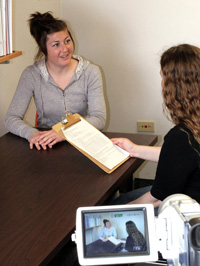
Do you qualify for in-state tuition at ISU?
The Experimental Psychology Program is a member of the Western Interstate Commission for Higher Education (WICHE) Western Regional Graduate Program (WRGP).
What is WRGP?
The Western Regional Graduate Program (WRGP) is an agreement among WICHE 16 member states and territories, through which participating Western public universities allow WICHE-region students to attend select out-of-state graduate certificate, master’s, and doctoral programs – and pay up to 150 percent of resident tuition.
Since public-university nonresident tuition rates are typically much higher than resident rates – sometimes by 300 percent or more–WRGP increases affordable higher education options for students, and minimizes student loan debt.
Eligibility Requirements
- Reside in a WRGP eligible state for at least 9 consecutive months prior to the beginning of the first academic term of WRGP acceptance.
- Proof of a permanent address in the WRGP state.
- Payment of state income tax on wages earned in the WRGP state.
- Proof of the following in the WRGP state:
- Vehicle registration
- Driver's license
- Voter registration
Qualifying States
Alaska, Arizona, California, Colorado, Hawaii, Idaho, Montana, Nevada, New Mexico, North Dakota, Oregon, U.S. Pacific Territories and Freely Associated States (CNMI, Guam, RMI, FSM, and Republic of Palau), South Dakota, Utah, Washington and Wyoming
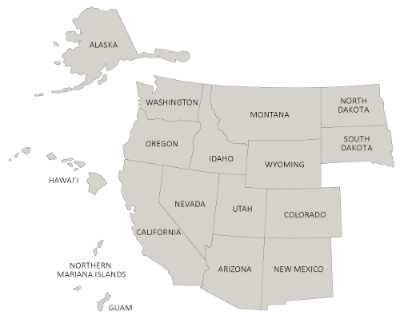
Curriculum
The current curriculum is designed to be completed in four to five years. A strong undergraduate psychology major is expected of most applicants. Should a student lack a strong background in measurement, statistics, research design, or other areas judged relevant by the faculty, he or she may be required to complete the undergraduate requirements for such courses prior to obtaining classified graduate student status. These students might take more than five years to complete the program.
The required course work for the Ph.D. program is intended to provide students with a general knowledge of the field of experimental psychology, and the necessary academic background to propose and complete a thesis and dissertation. Elective course work permits the student to specialize in an area of psychology. All students must complete 67 credits of required courses and electives:
Given the Graduate School's continuing registration requirement, once a student initiates thesis or dissertation research, at least one (1) academic credit is required each semester, including the summer semester, and until degree completion.
| Methodology and Statistics (6 credits) | |
| PSYC 6627 Statistics and Research Design I | 3 cr |
| PSYC 6632 Statistics and Research Design II | 3 cr |
| PSYC 6637 Multivariate Statistics and Research Design | 3 cr |
| Research (28 credits) | |
| PSYC 5583 and/or PSYC 6641 Special Problems | 10 cr |
| PSYC 6650 Thesis | 6 cr |
| PSYC 8850 Dissertation | 12 cr |
| Core areas courses (12 credits) | |
| Students must also complete four courses from the following core areas of psychology: | |
|
Students can choose between ONE of the following courses to satisfy ONE core course: PSYC 5531 Behavioral Neuroscience I (3 cr) PSYC 5532 Behavioral Neuroscience II (3 cr) PSYC 5537 Cognitive Neuroscience (3 cr) PSYC 5539 Social Neuroscience (3 cr) |
|
| PSYC 5570 Advanced Topics in Learning | 3 cr |
| PSYC 6642 Cognitive Psychology | 3 cr |
| PSYC 6643 Advanced Social Psychology | 3 cr |
| PSYC 6644 Advanced Developmental Psychology | 3 cr |
| PSYC 6647 Advanced Personality | 3 cr |
Electives (18 credits)
In addition, students must complete 18 credits of elective classes. Up to nine credits of these electives may be taken from outside of the Psychology Department. Electives should be approved by the student's faculty advisor.
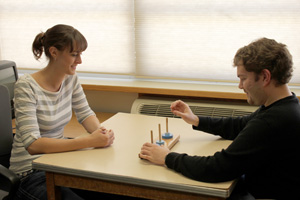
Students entering the doctoral training program at Idaho State University with a master's degree from another institution will receive full or partial credit, based on an examination of completed course work and research. The Department Chair, the Director of Experimental Training, and the departmental subject matter expert(s) will review all relevant documents and determine the course work and research, if any, that will be required to compensate for omissions and/or non-equivalency. Students may be admitted to candidacy for the doctoral degree upon satisfactory completion of the Master of Science degree (or its equivalent) and the Qualifying Exam. Candidates for the doctoral degree may not propose a dissertation (PSYC 8850) until admitted to candidacy.
Research Development: Upon completion of Area Requirements plus PSYC 6627 and PSYC 6632, and the thesis prospectus, doctoral students are required to pass a Qualifying Exam to be admitted to doctoral candidacy. The exam samples each student's integrative writing skills and conceptual abilities. Students write independently on integrative topics from across the foundational areas of general psychology or from an individualized and focused area of scholarly research.
A five-member doctoral committee will be formed by the student and his/her advisor. Three members of the doctoral committee must be full-time equivalent faculty members of the Department of Psychology, including at least one clinical and one experimental faculty member. The fourth and fifth members must meet Graduate School requirements and include the Graduate Faculty Representative. Students will present findings and implications of the dissertation to departmental faculty, students, and community members at an open forum.
Minimum Credits: Including requirements of the Master of Science Degree, the minimum total credits required for the Doctor of Philosophy in Experimental Psychology is 64.
